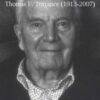Tag: Theological
The Relationship of Natural Science to Theological Science in the Thought of TF Torrance
Here is some TF Torrance on the way he thinks the natural sciences and theological science might relate; might even complement each other from their own distinctive verities. . . . theological science and natural science have their own proper and distinctive objectives to pursue, but their work inevitably overlaps, for they both respect and operate through the same rational structures of space and time, while each develops special modes of investigation, rationality, and verification in accordance with the nature and the direction of its distinctive field. But since each of them is the kind of thing it is as…
The Miracle of the Gospel as Theological Ontology-Epistemology
The Gospel, the Incarnation is a miracle not of this world. This is why abstract philosophical constructs cannot handle the weight of the Gospel, they end up distorting it. The Gospel comes with its own rationality, one that is funded by the miracle of the Incarnation. The rationality of this world, of the type that the ancient philosophers have developed, cannot scratch the surface of the miracle of the Gospel. The world and all of creation is contingent upon this miracle, the Gospel; the world was created for the Gospel, not the other way around. As such, in order to “discover” the…
On the Virtue of Theological Jargon
I post lots of things that are full of theological jargon, and I’m sure leave many scratching their heads. But I think it’s elevating. One of my former Bible College profs, Dr. Rex Koivisto, used to say “I like your altitude,” if he could tell you were tracking with things; stretching, and thinking deep thoughts about the Bible and the living God. If nothing else it is important for other Christians to understand that deep thoughts are available, often signified by “precision language,” or jargon. Theological jargon might appear to be merely academic jargon, but it isn’t. The best of…
On Being Apocalyptic and Anti-Natural Theology in Theological Orientation
I wrote the following four years ago. This locus remains my primary point of theological interest. That is, how the Christian claims to know God, under what pressures, has the greatest theological, political, sociological, and ethical implications we could fathom. As you will see, beyond the programmatic entailments engaged with in the following, natural theology, and adherence to it, has clear and present impact on the daily lives of real-life people; whether personally or collectively (as a society). If it is maintained that God and His ways can be known in an abstract ground latent in human reason, consciousness, or brute…
On the Eschatological Nature of the Theological Task
For Barth dogmatic theology is eschatological, dynamic, personal, and scandalously particular to the person and work of God in Jesus Christ. That is why the work of dogmatics is semper reformanda per the ground and grammar of God’s triune life in Jesus Christ. The work of dogmatic theology is a Petrine ‘growing in the grace and knowledge of Jesus Christ’ in ‘whom are hidden all the treasures of wisdom and knowledge.’ This implies that dogmatic theology should never be stifled by static reception or repristination. As Christians, theologians, we aren’t engaged in an impersonal arid work of dialectical analysis, per…
John Calvin’s Theology of the Cross as Theological Theology
Staying on theme from the previous post, let’s continue to focus on the theologia crucis; except this time it won’t be Luther’s, but John Calvin’s. Karl Barth in his Church Dogmatics III/1 refers us to the foreword Calvin wrote for his Commentary on the Book of Genesis (1554). Herein Calvin offers something that sounds intimately close to Luther’s thinking on a theology of the cross. So Calvin: indeed it is vain for any to philosophize in the manner of the world, unless they have first been humbled by the preaching of the gospel, and have instructed the whole compass of…
On Being Child Like, Playful, and Joyous as the Christian’s Life of Theological Existence
All of life is theological, or it should be for the Christian. There isn’t one aspect of life, for me, that isn’t consumed by the love of Christ. And this, I think, is the basis for what ought to count as genuinely theological: viz. a life grounded in the prior reality that God in Christ first loved us that we might love Him. It is out of this constraint that the Christian’s life ought to be compelled to do all that it does and thinks from. Ever since I became a Christian, as a wee lad, I have had this…






